




 |
   |
 |
|
Psycho Realm Psychodots Psyclone Rangers Psykick Lyrikah Tito Puente & His Orchestra |
Puffy Joe Pug Pugwash Pulp |
Pulsar Purplene Purson Push Stars |
Pussy Pye Fyte Pyramid Pythagoras |
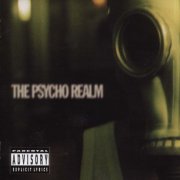 |
The Psycho Realm (1997, 57.32) **/T½ |
|
| Psycho City Blocks/Psycho Interlude Showdown The Big Payback Premonitions Interlude/Stone Garden/Interlude Temporary Insanity Doors Intro/Confessions of a Drug Addict Who Are You Interlude/Bullets |
Love Letters Intro/Love From the Sick Side R.U. Experienced/Outro Psyclones Lost Cities La Conecta Intro/La Conecta (pt. 1) La Conecta (pt. 2)/Goin' in Circles Outro |
|
Current availability:
Mellotron used:
In order to take The Psycho Realm at all seriously, you have to take one thing for granted: in their hip-hop world, words/lyrics/'rhymes'/whatever assume far greater importance than the actual musical content, leaving those of us on the outside bewildered and bored after about half the first track. The Psycho Realm is French hip-hop with English-language rapping, presumably in an attempt to appeal to the international audience, although I've no idea whether or not they've actually managed to achieve this. In fairness, the album isn't completely predictable, with a harpsichord part on Preminitions, although it's probably a series of lengthy samples rather than someone actually playing all the way through. In fact, several tracks feature classical samples; they've probably worked out a way not to have to pay royalties on them, while giving them a minor advantage over their competitors by doing something slightly different, while not being different enough to entirely alienate the typical rather conservative hip-hop fan. Cynical? Moi?
Mellotron on a few tracks from Randy Cantor, with a couple of string chords on Psycho Interlude that sound 'played once, then sampled', with 'proper', albeit boring playing on The Big Payback and Temporary Insanity. It's probably at its most obvious on Who Are You Interlude, although it sounds like a sampled phrase again, with more of the same on Love From The Sick Side, after the particularly obnoxious Love Letters Intro. Why does this stuff have to be so aggressive and why is everyone a 'motherfucker', motherfucker? Tediously, unthinkingly sheeplike. More of the same on Psyclones and that's your lot. If you were to add up the minutes of Mellotron use here, it would probably be relatively high, but if you could add up the amount of time Cantor actually played it, the figure would be very different, which accounts for the low T rating above.
So; do you give a shit about what some bunch of blokes feel they need to go around shouting about? Pretty much a central tenet with this stuff, so unless you synpathise with, er, whatever injustice it is they're going on about, you're probably going to be left pretty cold by this. I know I was. A surprising amount of Mellotron, although the bulk of it seems to be odd phrases sampled and repeated ad nauseam in typical hip-hop style. Y'know what, chaps? Do something REALLY outrageous: record an album using real musicians throughout and eschew repetition for creativity. Oh, sorry; I suppose you'd evolve out of your style completely and your fanbase would evaporate. Typical.
 |
Psychodots (1991, 52.22) ***/T |
|
| Master of Disaster Exaggeration Stella Another Reminder Livin' in a Lincoln Water Under the Bridge Artichoke I See Thru You |
Open Window Sad Little Monkeys Creature of Habit A Walk Thru the Garden Less Blue Enough |
|
 |
On the Grid (1993, 44.06) ***/T |
|
| Big Love Now Angel Tired of Waiting Candy Laura Used to Be Copy Machine King of Beers |
Death Ranch Help Yourself Standing 8 Boneyard |
|
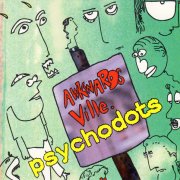 |
Awkwardsville (1995, 41.40) **½/½ |
|
| Mattress Prairie Dog Town Hell Bed of Nails Joy & Madness Lucky Me When There's Rain More to Life |
Moaner Human Bean Playing Dead |
|
Current availability:
Mellotrons used:
Ohio's Psychodots (or 'The Dots') morphed out of The Bears, when Adrian Belew (!) left, leaving a core trio who recorded four albums over a fifteen-year period. Their rather overlong eponymous 1991 debut is a kind of '90s indie/powerpop/Americana thing, in a 'college radio' way, like a budget R.E.M., maybe, at its best on opener Master Of Disaster (frontload that record!), Another Reminder and the acoustic Water Under The Bridge. Acceptable enough, but all a bit unexciting. Bassist Bob Nyswonger plays Mellotron, with flute and string parts on Sad Little Monkeys and a brief flute/strings mix (?) on the fade of Less Blue.
They followed up with '93's On the Grid, effectively more of the same, albeit at a more sensible length, better tracks including the jangly Angel (killer 12-string solo!), the energetic Candy and Standing 8's Coral Sitar solo. Nyswonger plays high flute and string Mellotron parts on Tired Of Waiting, flutes on King Of Beers and distant strings on closer Boneyard, to passable effect. 1995's Awkwardsville hits the point of diminishing returns, at its least uninteresting on Hell and closer Playing Dead, lyrics clearly considered more important than music all round. Nyswonger barely plays that Mellotron this time, with flute notes drifting in and out of the mix on Prairie Dog Town; hardly the most upfront use you'll ever hear, but at least it doesn't sound sampled.
See: Rob Fetters
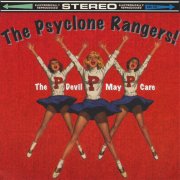 |
The Devil May Care (1995, 42.34) **½/T |
|
| Deal Ain't Goin Down Firenze Tilt-a-Whirl Boyo The Awe Song Why The Hell Did I Die? I'm Straight |
Dejesus Nazi Mother Dr. Softness Mono Town |
|
Current availability:
Mellotron used:
Going by 1995's The Devil May Care, Philadelphians The Psyclone Rangers were a punk-end-of-alt.rock outfit, occasionally tempering their aggression with slightly more thoughtful material, notably Boyo and (relatively) lengthy slowburn closer Mono Town.
Producer Ian Caple plays skronky Mellotron strings on Boyo (clearly the Ardent Studios' machine, as the album was recorded there), not least a sustained high F at the beginning of the track. However, vocalist Jonathan Valania is credited with 'additional Mellotron', so I can only assume he plays it on the same track, as it isn't obvious anywhere else.
 |
Jamais Trop Tard (2013, 50.30) ***/½ |
|
| La Minute Qui Suit Invisibles Jamais Trop Tard Décembre Interlude Rouge Le Souffle Les Marches de l'Enfer Le Soir pour Toi |
Interlude Gris Aux Portes de la Ville Mon Visage La Ligne Rouge Jour Quinze Sortie |
|
Current availability:
Mellotron used:
Psykick Lyrikah were a Rennes-based rap collective, fronted by a chap calling himself Arm. Ignoring an early cassette release, 2013's Jamais Trop Tard (Never Too Late) was their fifth (and seemingly last) album, an unusually musical effort, going by the genre's atrocious standards, no doubt due to the presence of several actual musicians, as against programmers, a.k.a. 'producers'. It seems French works particularly well in hip-hop, possibly surprisingly, perhaps due to the throaty aspect of many of its vowel sounds. The material suffers from the usual genre problem of being overly-repetitive, albeit less so than your standard generic album, at its best on Interlude Rouge, Le Soir Pour Toi, with its tenor sax samples and the synth work on the brief Interlude Gris, but is that the wildly overused John Bonham When The Levee Breaks sample I hear on La Ligne Rouge?
Chien Vert provide musical backing on closer Sortie, their keys man, Nicolas Méheust, playing (his?) Mellotron, with what sound like flutes, pitchbent at times. Certainly better than the average, including the genre's major names, but neither an album the bulk of you will enjoy, nor one for Mellotron fans.
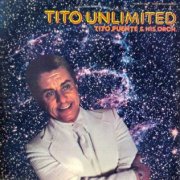 |
Tito Unlimited (1974, 35.44) ***/TTT½ |
|
| Watu Wasuri Acosta's Feeling Valley of the Dolls Que Paso (Wa Happens) Borinquen Vibe Mambo Margie's Mood Guajira en Puerto Rico |
Lost Horizon Infinite Love |
|
Current availability:
Mellotron used:
New York-born (of Puerto Rican parents) Tito Puente (1923-2000) was one of the biggest names in the American Latin music scene, not to mention the composer of Oye Como Va, of Santana cover fame. His glory years were behind him by the time he released 1974's Tito Unlimited, the world having moved on in the meantime, clearly making little difference to his dedication to the mambo. The album's at its best on Lost Horizon, presumably the theme tune to the film, given its mock-'Eastern' stylings.
Puente opted to play Mellotron on the album, for some reason. Budget? Anyway, we get chordal strings on opener Watu Wasuri, a single-note string part and lead flutes on Acosta's Feeling, 'stabby' strings and polyphonic flutes on Que Paso (Wa Happens), chordal strings and choirs on Borinquen, strings and flutes on Margie's Mood, cellos on Guajira En Puerto Rico and upfront strings on closer Infinite Love. This is pretty much bombproof on the critical front; how can I judge music that means zilch to me, yet is obviously composed and performed to the peak of the artist's ability? Doesn't stop me in the world of modern indie, but this does what it does to perfection, aided by a large helping of Mellotron.
 |
Nice (2003, 48.53) ***½/T |
|
| Planet Tokyo Tokyo Nights Angel of Love Sayonara Invisible Tomorrow Thank You Long Beach Nightmare Your Love is a Drug |
K2G (Kimi Ni Go!) Shiawase (Happiness) (Urei) Teen Titans Theme Red Swing |
|
 |
Bring it! (2009, 48.02) ***/T½ |
|
| I Don't Wanna My Story Bye Bye My Hero! Shuen no Onna DOKI DOKI Twilight Shooting Star! Hare Onna |
All Because of You Anata to Watashi Hiyori Hime Bring it on |
|
Current availability:
Mellotrons/Chamberlin used:
Puffy, or Puffy AmiYumi outside Japan (due to a threatened lawsuit from that buffoon Sean "Puffy"/"Puff Daddy"/"Puff Diddy"/Puff-whatever-the-fuck) are the female duo of Ami Onuki and Yumi Yoshimura, solo artists for Sony who teamed up and hit big, selling millions of albums in their native country. They have had their own TV show and even a cartoon series in the States, where they appeal strongly to pre-teens, as far as I can work out. Given that they were named and are produced by ex-Jellyfish drummer Andy Sturmer, giving them a vastly better sound than most J-Pop, with loads of powerpop and other American influences, I think this can generally be regarded as a Good Thing. OK, you may be put off by the typically cutesy girl vocals (mostly in Japanese), but, going by 2003's Nice, songs of the quality of Planet Tokyo, Sayonara and Invisible Tomorrow put this several levels above what you might expect. Sturmer's credited with Mellotron and Chris James with Chamberlin, but all I can hear are (Mellotron?) flutes and (Chamberlin?) strings on Angel Of Love, although I'm sure they're buried away elsewhere on the album. Nice John and Yoko reference on the sleeve, too.
Six years and several albums on, Bring it! appeared in 2009. Nominally very similar to Nice, I'm afraid to say that the material's rather less appealing, although not enough to mark it down too heavily, although I have to mention parts of Anata To Watashi's similarity to 10cc's The Things We Do For Love. Uncredited Mellotron (and Chamberlin?), with a nice string part on Bye Bye and some background flute chords on My Hero!, Hare Onna and All Because Of You, although none of it adds up to all that much, really.
So; two albums in a similar style, one rather better than the other, proving the point that it's all down to the songwriting at the end of the day. More tape-replay work on Bring it! than on Nice, but the latter's single track is more impressive than any of the four on the former.
See: Jellyfish
 |
Windfall (2015, 35.52) ***½/½ |
|
| Bright Beginnings Veteran Fighter Stay and Dance The Measure Create Hosannas Burn and Shine O My Chesapeake Windfallen |
Pair of Shadows If it Still Can't Be Found |
|
Current availability:
Mellotron used:
I can't imagine no-one else has noticed, but, on the sleeve of Joe Pug(liese)'s Windfall, he looks exactly like a young Jonathan Ross (famous UK TV presenter, for Americans), for his sins. That aside, his third release, 2015's Windfall, is a bleak (but in a good way), country-inflected singer-songwriter album, the sparse arrangements only serving to accentuate Pug's studied lyricism. Highlights? Opener Bright Beginnings, The Measure and O My Chesapeake, complete with pedal-steel, but, if truth be told, there ain't a bad track here.
Wilco's Pat Sansone plays Mellotron, with somewhat background strings on closer If It Still Can't Be Found, although whether or not they're real can only be a matter for conjecture. Is this Wilco's MkVII? Or their digital machine? Or something else entirely? Anyway, hardly a reason to hear this album, although the songs are.
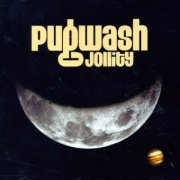 |
Jollity (2005, 44.01) ****/T½ |
|
| It's Nice to Be Nice Black Dog A Rose in a Garden of Weeds I Want You Back in My Life This Could Be Good Poles Together Even I Something New |
Waltz #714 Lullaby #1 Anchor |
|
 |
Eleven Modern Antiquities (2008, 37.34) ****/TTT½ |
|
| Take Me Away Cluster Bomb Here It's So Fine Song for You My Genius Limerance |
Your Friend The Cannon and the Bell At the Sea Lansdowne Valley |
|
Current availability:
Mellotrons/Chamberlins used:
Thomas Walsh's Pugwash (clearly named after the good captain) are the latest in a long and honourable line of 'intelligent pop' outfits, influenced by the 'B's - The Beatles, The Beach Boys, Big Star, The Byrds etc., not to mention later adherents such as XTC, Jellyfish and many others. Like most of the above (though not Badfinger, the other 'B'), Pugwash use tape-replay, although I've recently discovered that a lot of it's sampled, notably the whole of 2002's stupendous Almanac.
Ignoring 2003's Earworm, a compilation from Pugwash's first two albums, it was three years before Walsh produced his first album with any genuine Mellotron, 2005's Jollity. What can I say? More of the same: more gorgeous '60s-influenced material, more beautiful vintage keyboards, more melodies to die for. Opener It's Nice To Be Nice is the Beach Boys, complete with patented piano and banjo (!) parts - I kept expecting to hear Carl's high harmony line coming through. The rest of the album carries on in a similar vein, though mostly less overtly any one particular band; as I said, more of that Almanac stuff. Gorgeous.
As for the album's Mellotronic input, we get just the one real one; Walsh has managed a real coup by getting Dave Gregory (XTC/Dukes of Stratosphear) to play on a few tracks, including his own Mellotron on a couple - he's actually credited as 'The "Duke" of Mellotrons' on Lullaby #1, with a string part on Poles Together to boot. Another seven of the eleven tracks are stuffed with samples; mainly strings, plus flutes here and there (alongside real strings on A Rose In A Garden Of Weeds) and even brass and guitar 'tapes' on Anchor, most of the fakeotron played by Thomas Walsh and Duncan Maitland.
Three years on and the pen of Thomas Walsh has written enough beautiful three-minute vignettes for another album. Eleven Modern Antiquities is every bit as good as you'd hope, with an even heavier XTC influence this time, although when you consider that Andy Partridge co-writes two songs, playing on one of them, that's hardly surprising. The most XTC-alike, Here, isn't one of his, either. I think it's the vocal melodies; Walsh seems to drop to the major seventh a lot (please excuse the technicality), in true late-period Partridge style. As with any album, there are stronger and weaker tracks here, although 'weaker' is a rather relative term, as nothing here makes you wish it hadn't been written, which is more than you can say for most singer-songwriter efforts.
The most real Mellotron on a Pugwash album yet; actually, I believe it's the same Novatron that was sampled for Almanac, now bought by Walsh; in fact, he seems to've credited it as 'Novatron' when it's real and 'Mellotron' when it isn't, which is handy. Anyway, it's on four songs out of the eleven; mostly strings, mostly played by Walsh, although Partridge plays (real?) Mellotron brass on his circus-like co-write At The Sea, along with acoustic guitar, kazoo and Swanee whistle (!). All in all, another triumph, Mr. Walsh. Now, how can we get more people to buy your wondrous records?
Anyway, if you listen to the above-named bands, or even if you don't, I really can't recommend all of these highly enough, to be honest; it's not every day that albums of this quality come along. Buy.
See: Samples etc. | XTC | Duncan Maitland
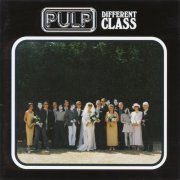 |
Different Class (1995, 52.06) ****/½ | |
| Mis-Shapes Pencil Skirt Common People I Spy Disco 2000 Live Bed Show Something Changed Sorted for E's & Wizz |
F.E.E.L.I.N.G.C.A.L.L.E.D.L.O.V.E. Underwear Monday Morning Bar Italia |
|
 |
This is Hardcore (1998, 69.57) ****/TT | |
| The Fear Dishes Party Hard Help the Aged This is Hardcore TV Movie A Little Soul I'm a Man |
Seductive Barry Sylvia Glory Days The Day After the Revolution |
|
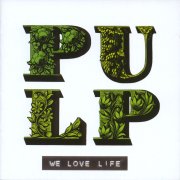 |
We Love Life (2001, 54.02) ****/T | |
| Weeds Weeds II (the Origin of the Species) The Night That Minnie Timperley Died The Trees Wickerman I Love Life The Birds in Your Garden Bob Lind (the Only Way is Down) |
Bad Cover Version Roadkill Sunrise |
|
Current availability:
Mellotrons used:
Sheffield-based Pulp had been around for a good ten years before they finally broke through, proving that sometimes persistence does pay off. With geeky but charismatic frontman Jarvis Cocker leading from the front, the excellent Different Class showed the rest of the so-called Britpop movement how it should be done, combining the band's '60s influences with a modern sensibility to superb effect, particularly on deserved smash Common People, a Cocker rumination on class difference, written from (bitter) experience. It has to be mentioned at this point that Jarvis is the best lyricist Britain has coughed up in the last decade or two, with his pointed observations on what it means to come from a working-class northern town; ironic, given the band's (eventual) considerable success, but it's impossible to hold that against the band, given their continued excellence, especially in the face of their less-talented contemporaries. You know who they are.
Different Class is the only one of these three albums to specifically credit the Mellotron (played by Jarvis, along with a raft of other eclectic vintage gear), but the sound is such a mélange that it's rather difficult to pick out exactly where the Mellotron might have been used. It sounds like an ascending string line on driving opener Mis-Shapes and some backing chords on Live Bed Show, but it's really quite hard to tell. The album's strengths, though, aren't anything to do with its Mellotron content, but the incredible strength of the songwriting; Common People, Sorted For E's And Wizz, Mis-Shapes and F.E.E.L.I.N.G.C.A.L.L.E.D.L.O.V.E. are all abiding classics, holding up just as well six years and another two albums later.
This is Hardcore was a fine, if slightly belated follow-up, opening with one of the darkest songs to have been written by a so-called 'pop group' well, ever, really; The deep melancholy of The Fear sums up single life with a quite devastating accuracy, as against the laddish idiocy of many of their peers - "The sound of loneliness turned up to ten" indeed. With no Mellotron credited and a similar mixture of sounds to its predecessor, I'm rather guessing here as to which tracks (if any) contain the mighty Mellotron, especially given the string section on four tracks. I'm certain the pitchbends on the excellent Help The Aged are Mellotron and the chord work on TV Movie sounds like it should be, too. There's an interesting mix of potentially-Mellotronic sounds on I'm A Man, including what may very well be brass on the key-clicky intro; the cheesy overlaid strings are definitely (?!) Mellotron. Sylvia's strings may well be, but the choir chord at the end is another definite. The rather extreme length of the album, by the way, is mainly due to the ten or so minutes of unadulterated one-chord solo string synth at the end of The Day After The Revolution, punctuated only by Jarvis intoning 'Goodbye' somewhere in the middle. Odd.
It took Pulp three years to come up with We Love Life and it was (mostly) worth the wait. Several new classics, including The Night That Minnie Timperley Died, The Birds In Your Garden and the excellent Sunrise, although like so many modern albums, they could probably have trimmed a couple of tracks along the way. I wouldn't absolutely swear blind that there's any Mellotron on the record, but it sounds like Mellotron strings and flutes on The Birds In Your Garden to me, so it's staying here until proven otherwise.
So; three great albums, in the '60s/'90s pop crossover Pulp have made their own. None of these are the greatest Mellotron albums ever, but you should own 'em all anyway.
See: Jarvis Cocker | Richard Hawley
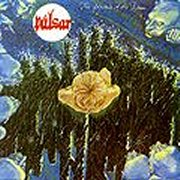 |
The Strands of the Future (1976) ****½/TTTTThe Strands of the FutureFlight Windows Fool's Failure |
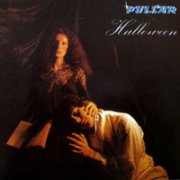 |
Halloween (1977, 39.10) ****½/TTTHalloween SongTired Answers Colours of Childhood Sorrow in My Dreams Lone Fantasy Dawn Over Darkness Misty Garden of Passion Fear of Frost Time |
Current availability:
Mellotrons used:
Pulsar were one of the best-known French progressives, actually having their first two albums released in the UK. Pollen (****) is pretty good, but its follow-up, The Strands of the Future is great, operating in the prog/space crossover area, complete with a side-long title suite; imagine symphonic prog with Hawkwind-style synths laid over the top, although they tone them down somewhat on side two. Jacques Roman's Mellotron use is pretty cool, too, with loads of strings and choir, plus Roland Richard's Solina, with the different string sounds complementing each other rather well, each being used where it sounds best. For strings, listen to Flight and Fool's Failure, with choirs on all three noted tracks, particularly The Strands Of The Future itself. Fabulous stuff.
Album no. 3, Halloween, drops all the odd synthy stuff, going straight for the jugular with an all-out concept symphonic prog classic; certainly one of the best of its kind ever to issue from France. My Musea LP only reproduces the original story in French, although I think the CD version translates it, so I can't actually work out what it's about, but the music's fantastic, so I'm really not that bothered. After the odd 80-second Halloween Song, they launch straight into the killer Tired Answers, with a lengthy Mellotron flute piece, before one of the best Mellotron string parts, well, ever, to be honest. Unbeatable. Sadly, the rest of the album is largely Mellotron-free, although there's a few seconds of strings on Colours Of Childhood and I still can't decide whether it's Mellotron or not on Dawn Over Darkness, so I've given it the benefit of the doubt.
See: Siiilk
 |
Purplene (2004, 41.31) **/½Love: WesternSwords Down Lyonhardt The Battler Second Shift Scars for Sores Cahoots=1 Watch the Watch |
Current availability:
Mellotron used:
Going by their eponymous 2004 album (their second and last), Australia's Purplene played a kind of post-rockist indie, loved by some, not least a gushing critic in Rolling Stone. Why? A track or two of this stuff is OK, but eight tracks in forty-odd minutes is at least five tracks too many, its lack of energy coming across not so much as gentle or moody, but lethargic. The guitars manage the occasional slightly angular section (Scars For Sores) or thoughtful arpeggiated part (Second Shift), but nowhere near enough to relieve the tedium.
Dave Ledlin plays Mellotron, with a repeating background flute melody on The Battler that sounds like it might actually have emanated from a real machine, which makes a nice change. Overall, then, Purplene features the occasional reasonable track weighed down by the mediocrity of the rest, with very little Mellotron. Maybe not.
 |
The Circle & the Blue Door (2013, 47.48) ****/TTTT |
|
| Wake Up Sleepy Head The Contract Spiderwood Farm Sailor Wife's Lament Leaning on a Bear Tempest and the Tide Mavericks and Mystics Well Spoiled Machine |
Sapphire Ward Rocking Horse Tragic Catastrophe |
|
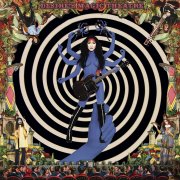 |
Desire's Magic Theatre (2016, 44.18) ***½/TTT½ |
|
| Desire's Magic Theatre Electric Landlady Dead Dodo Down Pedigree Chums The Sky Parade The Window Cleaner The Way it is Mr. Howard |
I Know The Bitter Suite |
|
Current availability:
Mellotrons used:
 |
Purson (named for a variety of demon) were led by Ros(al)ie Cunningham, whose vaguely Grace Slick-esque vocals, early '70s-styled guitar work and period influences dominate their sound. Snapped up by Rise Above (to no-one's surprise), their debut, 2013's The Circle & the Blue Door, sits at a point perfectly balanced between hard rock, psych and wyrd folk, many of its tracks covering all three bases simultaneously. Comparisons have been made with the likes of Black Widow and Coven, but Purson are heavier than those outfits ever were, material like the superb Spiderwood Farm and Mavericks And Mystics cranking it up further than those outfits ever dared (though not, by modern standards, that far). Other highlights include the folky Sailor Wife's Lament, the amusingly-titled Well Spoiled Machine and the vaguely Sabbath-esque Sapphire Ward; to be honest, there isn't a bad track here, which isn't something you can say of too many albums these days.
Rosie plays my M400 on most tracks, with a flute melody and chordal strings on opener Wake Up Sleepy Head, Crimson-esque strings on The Contract, violas (I think; you'd have thought I'd know my own tapes by now, wouldn't you?) and flutes on Sailor Wife's Lament, a heavily-reverbed something (oboe? French horn?) and strings on Tempest And The Tide, an exceedingly brief solo flute part at the end of Mavericks And Mystics, strings in fifths on Well Spoiled Machine, little string swells in Sapphire Ward, background strings and a flute melody on Rocking Horse and, finally, chordal strings on closer Tragic Catastrophe. Does that make this a full-blown Mellotron Album? I think it does, with some excellent music into the bargain.
After leaving Rise Above, it's taken the band three years to follow up with 2016's Desire's Magic Theatre, although, I have to say, a slight lack of joie de vivre might be detectable in places, at least compared to its predecessor. Highlights include the rolling title track, the suitably Hendrixy Electric Landlady (old joke, though) and the bit in The Bitter Suite where everyone goes mad simultaneously, while the vaguely glammy Mr. Howard kicks off like the bastard child of Blackfoot Sue's Standing In The Road, which is no bad thing. Rosie plays my Mellotron again, with what amounts to a flute solo on the opening title track, vibes on Electric Landlady and Dead Dodo Down, a heavily psychedelic, phased string line on The Window Cleaner, strings on Mr. Howard and chordal flutes and strings on I Know and The Bitter Suite (although the cellos on both sounds real) and is that brass on The Bitter Suite? Another good effort, then, though perhaps with fewer highlights than before. Worth hearing, though.
See: Rosalie Cunningham
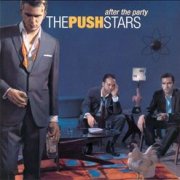 |
After the Party (1999, 46.58) **/T |
|
| Any Little Town Drunk is Better Than Dead Cinderella Too Much Pride Everything Shines Moving Target Meet Me on Main Street Minnesota |
Back to the Party Sofkuri's Room Cash Cadillac |
|
Current availability:
Chamberlin used:
The Push Stars (from Cambridge, Mass.) formed in the mid-'90s, 1999's After the Party being their second full-lengther. If I were to tell you that they've had songs used on TV shows, what would you think? Correct: they're horrible. Breezy indie pop/rock, at its least unpleasant on Meet Me On Main Street.
Jon Brion does his usual Chamberlin thing, with chordal strings and cellos on Cinderella. Have I said enough to stop you going anywhere near this album? Yes? Good.
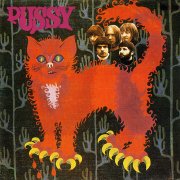 |
Pussy Plays (1969, 35.53) ***½/½Come Back JuneAll of My Life We Built the Sun Comets Tragedy in F Minor The Open Ground Everybody's Song G.E.A.B. |
Current availability:
Mellotron used:
Pussy are yet another 'can't say I know a lot about them' band, especially since the demise of the online Borderline Books site (grrr). What I can tell you is that Pussy Plays is a rather good late-period psych album, almost crossing over into prog in places; the only comparison I can come up with (and it isn't that close) is early Yes in their Peter Banks/Tony Kaye first album phase, although the vocals are (unsurprisingly) far more mainstream. Hints of early Floyd, too, though these really are only the vaguest of pointers. Not a bad track on the album, with Comets being the most oft-quoted fave, with its bonkers Theremin work, leading one to opine, "Why didn't they make it?". Who knows? There are always dozens of factors in a band's success or otherwise, musical quality usually coming fairly low on the list.
On the Mellotron front, ignore any overenthusiastic reviewers who use phrases such as 'Mellotron-soaked' or similar; Tragedy In F Minor features some very upfront MkII Mellotron saxes at the beginning and end of the song, key-click and all, but that is absolutely your lot. So; an unfairly obscure album from a fascinating period, well worth hearing, but, despite its good use of an unusual sound, not a Mellotron Album in any way.
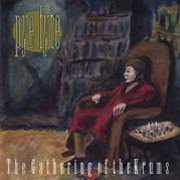 |
The Gathering of the Krums (1998, 42.11) ****/TTTTTInvitationPitch the Wort The Return Leaves The Party The Gathering Fields Depth of Time |
Current availability:
Mellotron used:
Pye Fyte are a rather odd proposition; extremely retro-prog from the States, with more than a nod towards late-'60s psychedelia, with none of the more contemporary influences of most current US outfits. Despite only being available on CD, The Gathering of the Krums is LP-length and I wouldn't mind betting it wasn't just because the band only had 42 minutes'-worth of material. The songs are excellent, too, so don't think this is just some exercise in 'retro for the sake of it'. Most of the tracks are relatively short, leaving the album's two closers, Fields and Depth Of Time clocking up well over 20 minutes between them, allowing the band to stretch out compositionally, particularly with the repeated phrase that closes the record.
John McNamara's Mellotron work is extensive and excellent; every track is soaked in the thing, right at the front of the mix, even above the vocals at points. The bulk of the use is the ubiquitous strings, but flute melodies crop up here and there (particularly on Fields) and opener Invitation is loaded with choir. I can hear the odd bit of modern synth/sample-playback here and there, but against the Mellotronic onslaught, they don't stand a chance. Plenty of 'solo spots' ensure that this is one of the most full-on modern Mellotron recordings around. Quite superb.
The Gathering of the Krums is another of those 'because we can!' albums, akin to Norwegians The Smell of Incense's Through the Gates of Deeper Slumber, where the Mellotron use is completely gratuitous and all the better for it. Buy.
 |
Pyramid (1976/1996?, 33.13) ***½/TT½Dawn Defender |
Current availability:
Mellotron used:
The Pyramid album is one of three concurrent re-releases from the British Psi-Fi label, all apparently originally released in tiny numbers on the German Pyramid label in the mid-'70s. It has been suggested by one or two spoilsports that they are '90s fakes, but this one sounds far too authentic for that; what is possible is that it was recorded by stoned session men on their day off, supposedly in 1975/76, with the band name tacked on later. It's basically a half-hour jam, played by musicians who knew what they were doing, ebbing and flowing in all the right places. Tension and release, I believe it's called...
It sounds like two guitarists, bass, drums and keys, including our beloved Mellotron, which drifts in and out of the album's single track in best space-rock style. There's a short choir section at around five minutes, then some strings at ten, more choirs at 18 etc., with a particularly nice (and decidedly authentic) string part starting at around the half-hour mark, lasting until the end of the piece. This is yer typical stoned, trippy sort of mid-'70s stuff, but it's pretty good at it and the Mellotron work is nice, if slightly sparse. Recommended for all spaceheads.
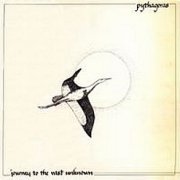 |
Journey to the Vast Unknown (1980 (81?), 41.54) ***/TJourney to the Vast UnknownPart I Part II Part III Part IV In to the in When it Comes |
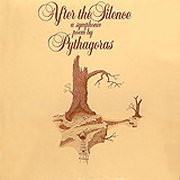 |
After the Silence (1981, 40.47) ***½/TTTT |
|
| After the Silence I 1st Movement: Introduction 2nd Movement Opus I: Diabolus in Musica Opus II: Étude for Flying V Opus III: Scherzo 3rd Movement: Endless Hymn After the Silence II 4th Movement Opus I: Turn Opus II: Return |
5th Movement Opus I: Caprice Opus II: Interludium Opus III: Reprice 6th Movement: Scherzo Reprice 7th Movement: Grand Finale |
|
Current availability:
Mellotrons used:
Pythagoras were apparently formed when a young synthesizer nut, René de Haan, impressed record shop owner and professional drummer Bob de Jong enough for the duo to record a couple of albums together. 1980 (or '81)'s rather primitive Journey to the Vast Unknown is a rather ordinary, pretty typical synth release, albeit with the addition of de Jong's drums, most of de Haan's synths sounding as cheap as they were. The material's far more melodic (and clearly highly arranged) than many similar, but it's all a bit ponderous, lulling the listener to sleep after a while, making him miss de Haan's distant Mellotron choirs on side two's In To The In and When It Comes, not that they add that much to the album.
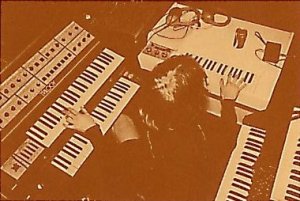 |
Their second (and last) release, '82's After the Silence (featuring several guest players), was a rather better effort, being more instrumental symphonic prog than EM as such, although there are too many moments of 'let's just let this one drift for a few minutes, shall we?' for it to be any real sort of classic. Saying that, it has several sublime moments, not least (and I'm guessing here) 5th Movement Opus II, where a string synth provides the fast string part, the Mellotron the chords, with the whole thing underpinned by future Ayreon supremo Arjen Lucassen's Taurus pedals. Nice.
De Haan's Mellotron isn't actually overused, with much of side one being Mellotron-free; much of his use is rather murky choirs, although the strings appear here and there. Plackband's Michel van Wassem guests on Novatron on 4th Movement Opus I, which may or may not explain the sustained choir chord (easily played on two Mellotrons), although the effect is relatively easy to produce using one M400 loaded with 8-choir. Essentially, although what appears to be the album's longest track, side one's 3rd Movement: Endless Hymn is fairly Mellotron-heavy, it's side two's After The Silence II where you'll find most of the Mellotron action.
Anyway, while these aren't the greatest albums you'll ever hear (particularly their debut), being rather short on ideas in places, they're not at all bad and the second features some great Mellotron work, not to mention bass pedals so high in the mix that they almost drown everything else out. Don't pay a fortune, but don't turn your nose up either.
See: Ayreon